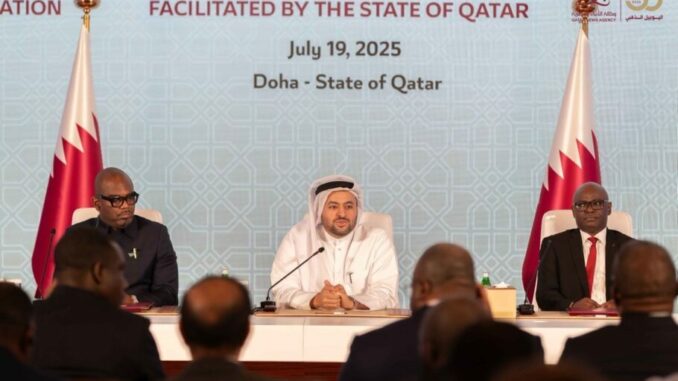
The Democratic Republic of Congo and M23 rebels, backed by Rwanda, have signed over the weekend a Declaration of principles in Qatar aimed at ending decades of conflict in eastern Congo. The agreement, facilitated by Qatari officials, outlines measures to build trust, including the exchange of prisoners and the restoration of state authority in regions currently under rebel control. However, the interpretation of the declaration’s terms—particularly concerning rebel withdrawal—remains contested.
While the Congolese government views the declaration as a pathway to the “non-negotiable withdrawal” of M23 fighters and the return of government presence, rebel leaders have rejected the idea of vacating strategic areas such as Goma. M23 leadership insists the declaration focuses on mechanisms to integrate state authority alongside their presence, not displacement. The differing interpretations signal potential friction ahead, despite the symbolic significance of the Doha-signed pact.
Cameroon’s Elderly President Struggles to Win Over Youth with Digital Campaign Blitz
https://afrique.tv5monde.com/sites/afrique/files/styles/diapo_908x605/public/2025-07-14/field_media_image-1499825-Paul%2520Biya%25202018.jpg?h=e69e7156&itok=2QY06VVo
In the lead-up to Cameroon’s October elections, 92-year-old President Paul Biya has significantly ramped up his digital presence in a bid to connect with the country’s overwhelmingly youthful population. His Facebook and X (formerly Twitter) accounts now post daily, a departure from his historically sparse communication style. However, analysts argue that the strategy lacks authenticity, interactivity, and relevance to the digital habits of young Cameroonians—most of whom rely heavily on WhatsApp, a platform Biya’s campaign has yet to effectively utilise.
Critics have also pointed out that much of the content on Biya’s social media is top-down, recycling excerpts from old speeches rather than offering genuine engagement or concrete policy proposals. This disconnect is evident among a generation burdened by unemployment, corruption, and insecurity. Young voters—over 60% of the population—are calling not for slogans, but for tangible changes and opportunities that address their daily struggles.
While State media have praised Biya’s digital makeover as a sign of adaptability and renewed vitality, reactions from ordinary citizens have been more cynical. Many perceive the campaign as cosmetic and out of touch. Some online users have even mocked the initiative, suggesting it is a late attempt to gain electoral traction among a digitally savvy demographic that has largely grown indifferent to the president’s decades-long rule.
Despite this, some analysts believe the effort—though limited—is still a marked shift from the president’s previous invisibility. It remains to be seen whether this digital rebranding will have any meaningful impact at the ballot box, especially as Biya faces increasing criticism and dissent even from former allies.
Niger Army Arrests 21 Terror Suspects in Zinder Region, Including Foreign Nationals
https://lh3.googleusercontent.com/proxy/Ez-2DWnDRSq6oSo33fKmSu76c3Ltd-kIvI5p3w24utVNT3MH1QKr0oZ_9FvkKllO9Yz-5cx6li0gCQ-DCx3AYfpbx7ntB2WO0ddEQYK9HNVlSLeGnHxmXofUDbFgrzmrDqgkSJqq9zGr7jPbFJoj-db-3pwR0QMQYwTxDtfWbYA
The Nigerien military has announced over the week-end the arrest of 21 individuals suspected of terrorism during a July 13 operation in the southeastern Zinder region.
According to a statement aired on national Television, the suspects were intercepted while travelling in five vehicles, and preliminary investigations revealed that 13 of them are foreign nationals, with the remaining eight being Nigerien citizens.
A search of the convoy uncovered materials with potential military applications, including camouflage clothing, communication and surveillance devices, fuel containers, cash, and large quantities of food supplies. Authorities have transferred the suspects and seized items to the capital, Niamey, for further investigation.
Over 1,000 Athletes Arrive in Abuja for 2025 African Karate Championship
https://cdn.guardian.ng/wp-content/uploads/2025/07/images-10-5.jpeg
More than 1,000 athletes from 31 African countries have arrived in Abuja, Nigeria, to participate in the 2025 African Karate Championship, scheduled from July 21 to 28.
The event, hosted by the Karate Federation of Nigeria (KFN), features four competitive categories: cadet (ages 14–15), junior (16–17), senior (18+), and para-karate for athletes with disabilities. KFN President Silas Agara confirmed that logistics, including accommodation and visa-on-arrival processes, have been challenging but are well underway, with technical officials from various countries already present.
The championship will also include the General Assembly of the African Karate Federation, further elevating Nigeria’s role as host. The KFN has been on ground for over a week ensuring smooth coordination of resources and transportation for visiting delegations. Agara expressed confidence in Nigeria’s preparedness, acknowledging the scale of responsibility involved in welcoming such a large contingent of athletes and officials.
Nigeria is set to field 60 well-trained athletes for the tournament, according to KFN Technical Director Dave Jegede. The national team includes several African and Commonwealth medalists who have undergone rigorous preparation through multiple national and regional competitions. With high morale and strategic training, the federation is optimistic about Nigeria’s chances of excelling in the continental championship.
